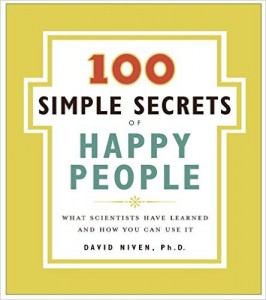Sharing Secrets
Originally published in March 2006
Despite the old saying about not judging a book by its cover, readers still put a lot of pressure on titles. We’re a society of scanners — scanning headlines, flipping channels and glossing over titles. A book won’t earn our time unless its title intrigues us and makes us want to know more.
Sometimes an author gets the title just right. Recently I passed by a little book called “The 100 Simple Secrets of Happy People“ by David Niven, Ph.D. I stopped short. Everybody loves a good secret, especially a list of them. Secrets leading to happiness? With a title like that, how could I not pick up the book?
 It was the first book I’ve read since completing “What to Expect While You’re Expecting” nearly four years ago. It’s a quick read, offering simple advice based on scientific research of the characteristics and beliefs of happy people. Following are my favorite 10 secrets from the book:
It was the first book I’ve read since completing “What to Expect While You’re Expecting” nearly four years ago. It’s a quick read, offering simple advice based on scientific research of the characteristics and beliefs of happy people. Following are my favorite 10 secrets from the book:
10. Turn off the television. Initially I balked at this advice. I love TV and a good show makes me feel happy. But the book’s point about television is that “too often we watch TV because that’s what we usually do rather than because there’s something we actually want to see.” Two hours watching dumb shows we don’t even care about is two hours we won’t ever get back.
9. Accept yourself. The book’s author notes that this doesn’t mean ignoring your faults. It just means accepting and even liking ourselves as a work-in-progress.
8. Have realistic expectations. Happy people “rig the game in their favor by choosing to value things that are within their grasp.” Sometimes we set ourselves up for disappointment by setting our expectations far beyond what is actually doable.
7. Develop a household routine. If you’re in the stay-at-home mom business like me, this advice will change your life. When I left my office job for full-time motherhood, I nearly went nuts because I worked all day yet rarely felt I was accomplishing anything. I learned to put everything on a list so that, even when I do something as mundane as vacuuming, I check it off my list and feel the satisfaction that comes from making progress. Progress makes us happy.
6. Events are temporary. Sometimes after a bad event, we’re certain happiness is simply not possible again. But the human spirit is amazing resilient. It rises up, even after a crushing blow. And sooner or later, a good event is bound to find us.
5. You always have a choice. I used to have a habit of saying “I have to do the dishes.” But the truth is we don’t really “have” to do anything but breathe. I could choose not to do the dishes until all the plates are piled in the sink and the kitchen smells like old chicken. But I choose to do the dishes to avoid that outcome. Just thinking of it as my choice rather than my “have to” duty makes it a little easier.
4. Be agreeable. This may be the best piece of advice in the book for people in relationships. Have you ever noticed how those people who love to argue are almost never happy? Don’t be a doormat. Just know that you don’t have to win every point to enjoy playing the game.
3. Realize that complete satisfaction does not exist. And neither does the perfect body or the perfect life. Reaching for it will only wear you out.
2. Help the next person who needs some minor assistance. If you ask a nurse, a sales clerk or a fireman who they like about their jobs, most will say “I like helping people.” Why? Because it makes them feel good. The book notes that “life satisfaction was found to improve by 24 percent with the level of altruistic activity.” You don’t have to rush into a burning building to get that good feeling. You could start by letting someone turn into your lane of traffic during rush hour.
1. Don’t forget to have fun. The book notes that kids instinctively know how to have fun. They don’t have to plan it or give themselves permission to do it.
Need an excuse for having fun? The book gives us one: “Individuals who spend time just having fun are 20 percent more likely to feel happy on a daily basis and 36 percent more likely to feel comfortable with their age and stage in life.” Don’t argue with statistics. Just go have some fun.
And, most of all, be happy.
Gwen Rockwood is a syndicated freelance columnist. Email her at rockwoodfiles@cox.net. Her book, Reporting Live from the Laundry Pile, is available on Amazon.
